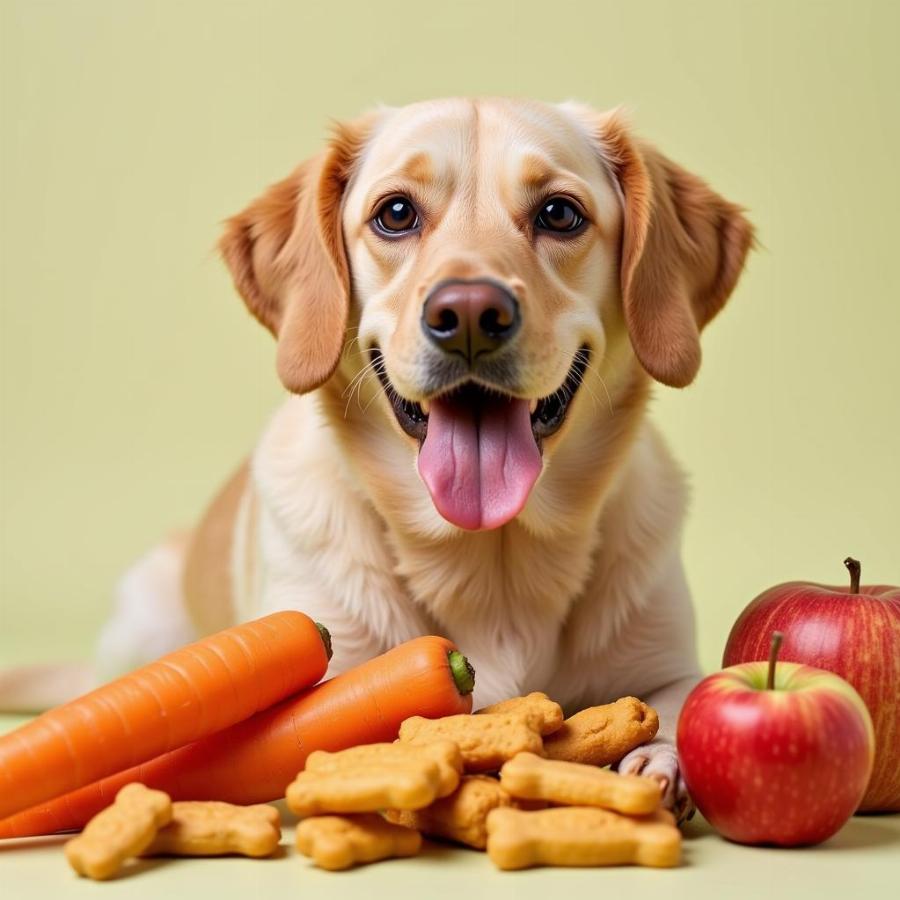Frozen Korean corn dogs, a trendy street food, are tempting to share with our furry friends. But can dogs eat them? The short answer is: it’s generally best to avoid it. While a small nibble might not cause immediate harm, these savory snacks aren’t designed for canine digestion and can pose several health risks. Let’s explore why frozen Korean corn dogs aren’t ideal for your beloved pet and discover some healthier alternatives.
While the delicious aroma of a freshly fried Korean corn dog might tempt you to share with your furry friend, it’s crucial to prioritize their health. These treats are often high in fat, sodium, and processed ingredients, none of which are beneficial for dogs. Moreover, the corn dog’s shape and texture can present a choking hazard, especially for smaller breeds. Understanding the potential risks associated with these treats is vital for responsible pet ownership.
Why Frozen Korean Corn Dogs Aren’t Ideal for Dogs
The high fat content in frozen Korean corn dogs can lead to pancreatitis in dogs, a serious and potentially life-threatening inflammation of the pancreas. Symptoms include vomiting, lethargy, and abdominal pain. Additionally, the excessive sodium can cause dehydration and exacerbate existing health issues like heart or kidney disease.
Beyond the immediate health concerns, regularly feeding your dog human food, especially processed snacks like frozen Korean corn dogs, can lead to long-term health problems such as obesity, diabetes, and digestive issues. These conditions can significantly impact your dog’s quality of life and lead to costly veterinary bills.
 Dog enjoying healthy treats instead of Korean corn dogs
Dog enjoying healthy treats instead of Korean corn dogs
Healthier Alternatives to Frozen Korean Corn Dogs
Instead of sharing your Korean corn dog, opt for treats specifically formulated for dogs. These are designed with their nutritional needs in mind and come in a variety of flavors and textures. You can find options for all life stages and dietary restrictions, ensuring your dog gets the right nutrients while enjoying a tasty snack.
Looking for a cool treat for a hot day? Try freezing some dog-friendly fruits and vegetables like blueberries, bananas, or carrots. These provide a refreshing and healthy alternative to processed snacks. You can also find recipes for frozen dog treats recipe online.
Can Dogs Eat the Batter of Korean Corn Dogs?
Even the batter used for Korean corn dogs isn’t safe for dogs. It often contains ingredients like wheat flour, sugar, and baking powder, which can be difficult for dogs to digest and can contribute to weight gain and other health problems.
What Should I Do If My Dog Eats a Korean Corn Dog?
If your dog accidentally ingests a Korean corn dog, monitor them closely for any signs of distress, such as vomiting, diarrhea, or lethargy. If they exhibit any unusual symptoms, contact your veterinarian immediately. Early intervention is crucial, especially if your dog has pre-existing health conditions.
Are There Any Types of Corn Dogs Safe for Dogs?
No, it’s best to avoid all types of corn dogs for your canine companion. The combination of processed meat, fried batter, and high levels of fat and sodium makes them unsuitable for canine consumption.
“While sharing food with our pets can be a way to show affection, it’s important to remember that what’s safe for us isn’t always safe for them,” says Dr. Emily Carter, a veterinary nutritionist. “Prioritizing their health and well-being means choosing treats that meet their specific dietary needs.”
Can My Dog Have a Small Lick of a Korean Corn Dog?
Even a small lick can be problematic. While it might not cause immediate harm, it can introduce your dog to the taste of rich, fatty foods, potentially leading to begging and undesirable eating habits.
Conclusion
While it’s tempting to share our favorite foods with our furry friends, frozen Korean corn dogs are not a safe treat for dogs. The high fat and sodium content, along with potential choking hazards, make them a risky choice. Opting for healthier alternatives like dog-specific treats or frozen fruits and vegetables will ensure your dog stays happy and healthy. Remember, providing a balanced diet and avoiding harmful foods is a crucial part of responsible pet ownership.
FAQ
- What are some signs my dog has eaten something they shouldn’t have? Vomiting, diarrhea, lethargy, and loss of appetite are common signs.
- What human foods are toxic to dogs? Chocolate, grapes, raisins, onions, and garlic are highly toxic to dogs.
- What should I do if my dog eats something toxic? Contact your veterinarian or a pet poison control center immediately.
- Are all human foods bad for dogs? No, some human foods like plain cooked chicken, carrots, and blueberries can be healthy for dogs in moderation.
- How can I find healthy treat recipes for my dog? You can find numerous recipes for healthy dog treats online or in dog-specific cookbooks. You can even explore options to learn where can i buy korean corn dogs for your own consumption!
- How can I keep my dog from begging for my food? Train your dog to stay in their bed or another designated area while you’re eating.
- What are some good chew toys for dogs? Look for durable chew toys made from non-toxic materials that are appropriate for your dog’s size and chewing habits.
Related Topics
- Homemade Dog Treat Recipes
- Toxic Foods for Dogs
- Canine Nutrition
Beaut Dogs is your one-stop shop for all things dog-related, offering expert advice on everything from breed selection to nutrition and training. From understanding unique breeds to discovering frozen dog treats recipe, Beaut Dogs has you covered. When you need assistance, feel free to contact Email: [email protected] for detailed and accurate answers from Beaut Dogs. Visit us today at https://beautdogs.com to explore the wonderful world of canine companions!